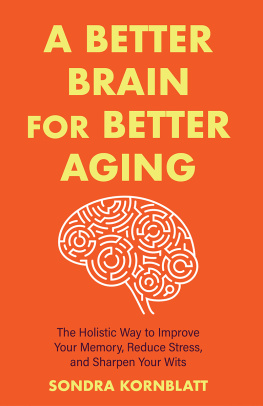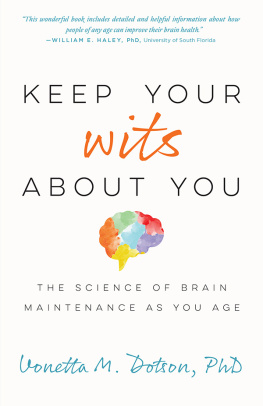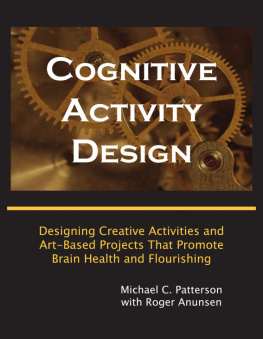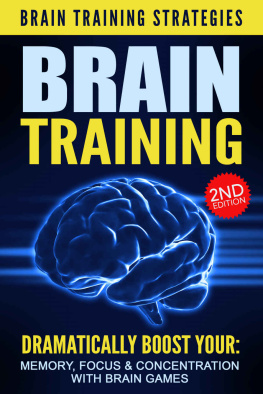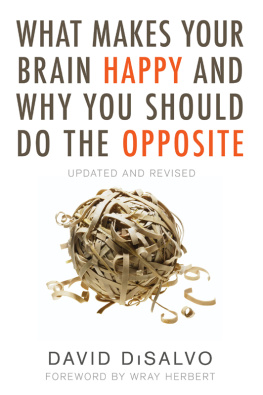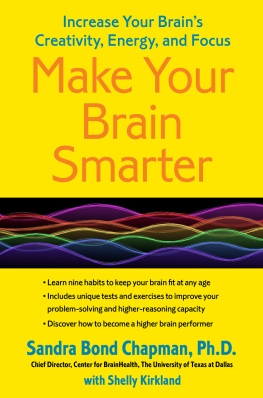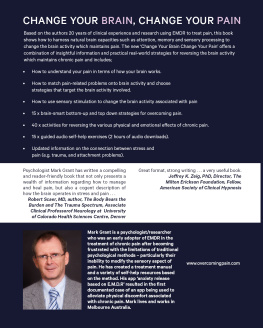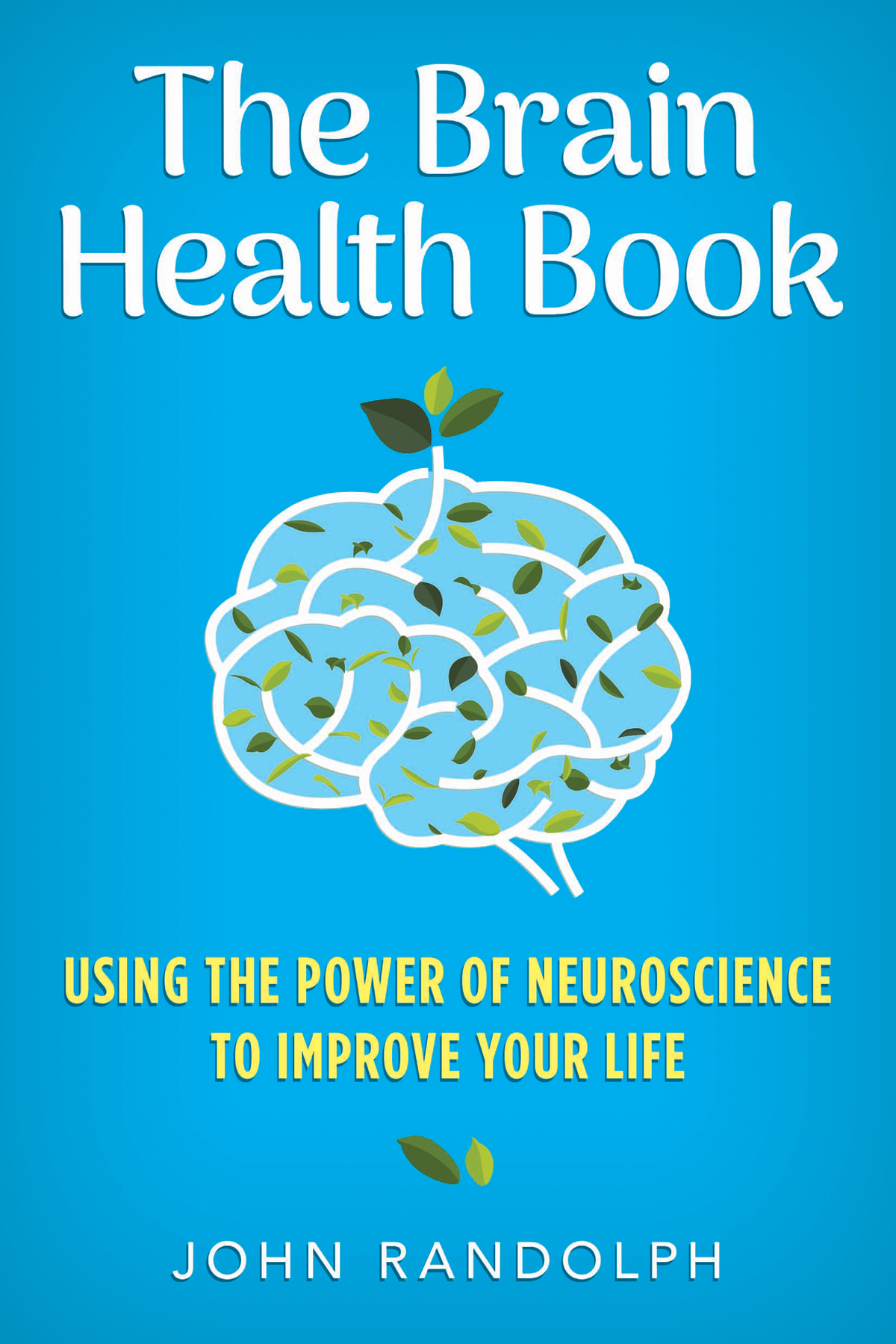Contents
Guide
Page List
Advance Acclaim
How does exercise potentially prevent Alzheimers disease? What type of memory problems should concern us as we age? What memory strategies actually work? Dr. Randolph has created an accessible, practical guide to improving brain health. Quizzes, case examples, myth-busting, and a user-friendly dive into relevant neuroscience make this an enjoyable, life-altering read.
Karen Postal, Ph.D., ABPP , Neuropsychologist, Clinical Instructor, Harvard Medical School
This book provides everything you need to know about preserving cognitive capacity as you age. Dr. Randolph has reviewed massive amounts of relevant research, translated it into a language everyone can understand, and extracted the important take-aways that allow the reader to convert words into action. I found particularly helpful the last chapter that summarizes the science of habit formation. This book does not over-promise (a pet peeve of mine when I look at self-help books), but gives the reader a blueprint for how to go about making lifestyle changes that can have a significant impact on brain health.
Peg Dawson, Ed.D. , Staff Psychologist, Seacoast Mental Health Center, Portsmouth, NH, co-author of numerous books on executive skills, including The Smart but Scattered Guide to Success: How to Use Your Brains Executive Skills to Keep Up, Stay Calm, and Get Organized at Work and at Home
The Brain Health Book
USING THE POWER OF NEUROSCIENCE TO IMPROVE YOUR LIFE
JOHN RANDOLPH

A Norton Professional Book
New York London
This e-book contains some places that ask the reader to fill in questions or comments. Please keep pen and paper handy as you read this e-book so that you can complete the exercises within.
For Kaia
CONTENTS
INFORMATION ABOUT THE BRAINAND HOW TO potentially improve its many functionshas become increasingly available in popular culture. Newspaper articles, online sources, and talk show hosts are often eager to tout the findings from one-off studies that purportedly clarify how the brain works or how it can work better. Commercials and junk e-mails praise the benefits of supplements or other products that are supposed to magically transform the brains inner workings. But what actually helps, and whats hype? Is there compelling science out there that can be translated and used to inform our decisions, strategies, and lifestyle choices?
In the 2000s, I started taking more notice of the science of brain health. I also wondered why this topic was not being discussed more frequently in my neuropsychology circles or in academic journals. Being a neuropsychologista clinical psychologist specializing in brainbehavior relationshipsI was much more aware of how to document and diagnose cognitive disorders than how to promote better thinking skills. Throughout my training, I heard repeatedly that once the brain was injured, diseased, aging, or otherwise not working properly, there simply wasnt much we could do about it. I never wanted to believe this.
As I continued to dive into research on brain wellness, I thought it would be useful to summarize some of it for my colleagues at an upcoming meeting. I gave a presentation on the topic and thought perhaps that would be it. Fate then intervened in the form of a publisher who had heard about my seminar and suggested that I consider writing a related book for a professional audience. I accepted this offer and enjoyed the labors and rewards of writing and editing a reference on brain health for people in my field.
During that process, I kept coming back to the idea that people outside my small professional zone would probably be interested in a book that considered the science of brain health. It seemed that it might be useful to translate the research for folks who were curious about neuroscience, neuropsychology, brain health, and related fields, but who hadnt necessarily been educated in those areas. Perhaps consider the science in a way that wouldnt go too far into the weeds but nevertheless clarified some brain-related ideas and terms we might hear in the media. Maybe share some of my own excitement related to recent developments in neurosciencelike our ability to grow neurons by exercising, a concept foreign to essentially all medical professionals and researchers until fairly recentlyand help clarify practical applications for our daily lives.
This is that book. I earnestly hope that you enjoy it. I also hope that you become fascinated and inspired by the cutting-edge neuroscience and behavioral research discussed here that is transforming our ability to make our brains healthier. Of course, science should not be kept in a vacuum: you can apply whats reviewed here immediately to potentially improve your own brain functioning, and, ultimately, your life. Ive also included some case composites throughout the book that detail how lifestyle choices have positively impacted cognitive skills in people Ive worked with. Incidentally, if youre interested in getting into the scientific details, there are plenty of references to academic papers at the back of the book that represent some of the most innovative brain health studies. Youre also welcome to not worry about any of that for now.
Either way, I encourage you to get comfortable, read through some or all of the chapters based on your interests, and appreciate that most of what we know of that helps the brain is free or inexpensive, fun, emotionally enriching, and stimulating (not to mention tasty). Your brain will thank you for it.
The Brain Health Book
WHEN WE THINK ABOUT HEALTH, WE DEFINE IT IN a number of ways. Physical health refers to our ability to stay free of illness or to recover quickly when we get sick. Cardiovascular health relates to how well our heart and blood vessels are working. Mental health can refer to many things, but usually this is discussed in the context of how we regulate our emotions and manage stress. We all strive to live in ways that maximize our health, although this is certainly easier said than done.
This book focuses on the type of health that I consider the elephant in the room: brain health, also known as cognitive health. All other aspects of health fundamentally depend on brain and cognitive health . The better we make decisions, remember new information, concentrate on tasks, and process information efficiently, the more likely our body will be firing on all cylinders. Your brains ability to function at its highest level is critically important regardless of whether youre in school, working, raising a family, or retired.
Youve probably seen references to brain wellness or cognitive health in lots of places. Your e-mail inbox may have been inundated with messages touting the benefits of supplements you may or may not have heard of. Perhaps youve watched infomercials on TV describing products or programs guaranteed to improve your memory in a short period of time. The supposed benefits of computerized brain games are trumpeted broadly. There are also a number of books on the topic of brain health; some have merit, while others might function best as kindling for a holiday fire.
This book isnt promoting a quick fix related to improving how your brain works. Think about it: if we were able to change our brains over a short period of time with a magic pill or strategy, wouldnt we all be doing this already? The brain has evolved to its current incredible state over hundreds of thousands of years. A marketing pitch that claims to change it meaningfully in a few days or weeks is simply, as my grandmother used to say, hogwash.



